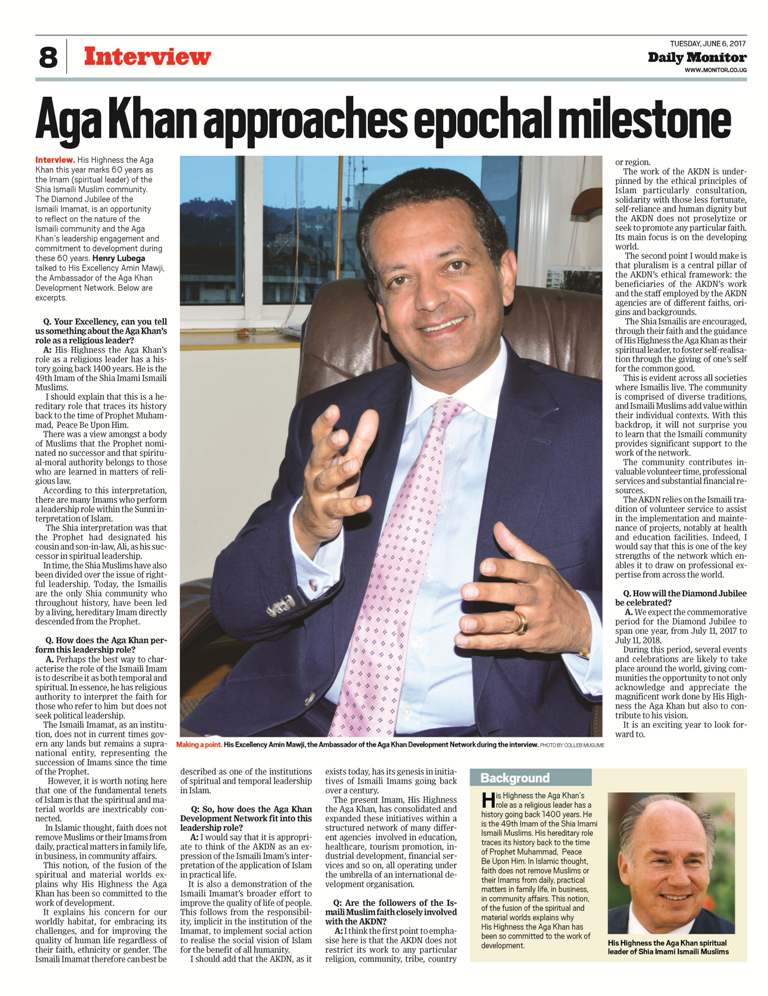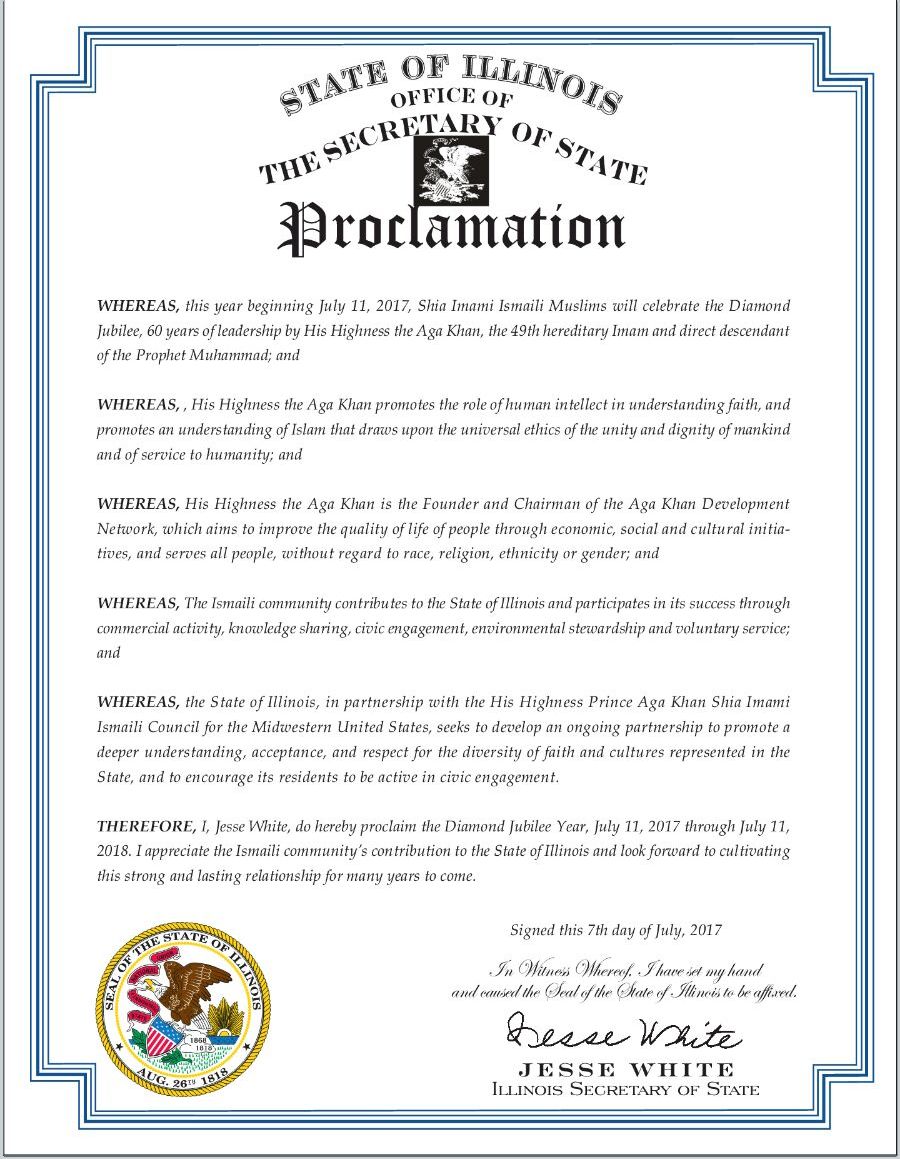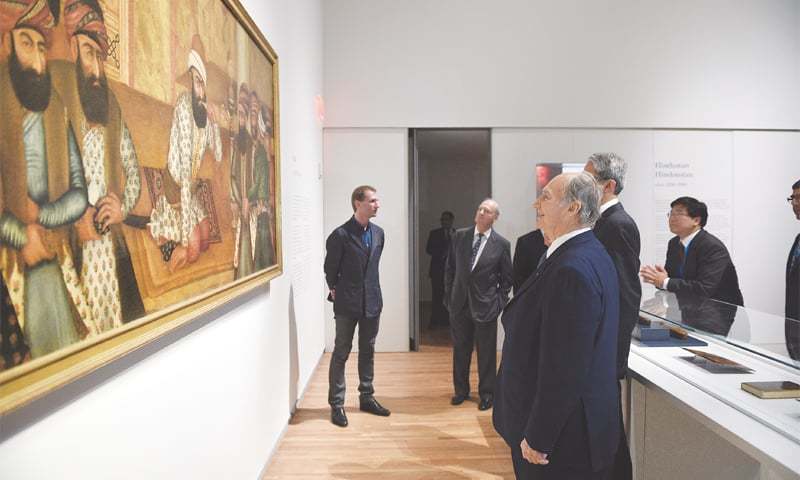http://www.nrgui.com/107-opinions/on-ne ... on-vatican
A Lisbonne, l’Aga Khan installe son « Vatican »
Publié le mercredi 12 juillet 2017 16:26
Écrit par Le Monde
Leader d’une communauté de 15 millions de musulmans, Karim Aga Khan IV établit au Portugal le « saint-siège » des ismaéliens. Le descendant du gendre du Prophète prépare aussi sa succession.

Il y a comme un malentendu persistant entre la familiarité que suscitent l’évocation du seul nom de l’Aga Khan et le parcours du personnage. Riche héritier d’une dynastie musulmane mythique, qui a connu des épisodes tapageurs – dont le mariage de son père, Ali Khan, avec Rita Hayworth en 1949 –, Karim Aga Khan a, en France et dans le monde occidental, l’image d’un milliardaire à la tête d’une écurie de chevaux réputée aux haras du château de Chantilly, et qui n’investirait dans le développement que pour se donner bonne conscience.
Lire aussi : Le business de l’écurie France
Mais l’Aga Khan, c’est d’abord et avant tout un descendant du gendre du prophète Mahomet. Ce 11 juillet, Karim Aga Khan IV, 49e imam de la lignée, sera à l’honneur. Quelque quinze millions de musulmans chiites ismaéliens, agriculteurs ou riches commerçants, médecins ou banquiers, dispersés entre l’Asie, l’Afrique et l’Occident fêteront le 60e anniversaire de son intronisation comme leader spirituel de la communauté. C’était en 1957, Karim Al-Hussaini avait tout juste 20 ans. Il était étudiant à Harvard.
Cette célébration sera l’occasion pour le désormais octogénaire de rappeler son attachement aux valeurs de pluralisme et de responsabilité individuelle de sa communauté. « En islam, les leaders ne sont pas là que pour interpréter la foi. Ils ont une responsabilité pour améliorer la qualité de la vie et des sociétés dans lesquelles vivent leurs fidèles », a-t-il confié au Monde à l’avant-veille des festivités.
Un concordat signé avec le Portugal
En tant que leader spirituel d’une communauté chiite minoritaire, Karim Aga Khan ne prétend pas endosser un « habit papal » pour un monde musulman morcelé et en crise. Mais l’idée d’un concile rassemblant toutes les obédiences l’inspire. Même s’il a conscience des limites d’un tel exercice. « J’ai envoyé des proches étudier les méthodes de médiation qui sont appliquées en Occident dans différents domaines, dit-il. Mais nous constatons que le dialogue entre les musulmans fonctionne mieux au niveau des villages qu’au niveau des Etats à l’heure qu’il est. »
Si dispersée et minoritaire soit-elle depuis plus de 1 200 ans, la communauté ismaélienne est en passe de rayonner à nouveau. Le 3 juin 2015, un accord avait été signé avec le Portugal pour l’installation à Lisbonne d’un siège mondial et permanent de l’« imamat ismaélien » – une sorte de Vatican sans Etat pontifical. « C’est un événement historique dans le sens où une institution théologique musulmane aura son siège dans un Etat laïc chrétien », souligne Karim Aga Khan. Après avoir un temps envisagé de s’installer au Canada, le leader spirituel s’est tourné vers Lisbonne pour son « Saint-Siège », qui emménagera dans le Palacete Henrique Mendonça, un édifice historique à l’architecture remarquable où l’Aga Khan lui-même devrait résider.
« Nous nous sommes inspirés du Concordat qui lie le Vatican et le Portugal », révèle-t-il. En 2015, l’Etat portugais a accepté de signer un concordat avec l’imamat, lui accordant une représentation institutionnelle et diplomatique – une première dans la longue histoire de cette communauté qui ne peut revendiquer aucune patrie. Lisbonne a aussi octroyé des exemptions fiscales importantes, comme à l’Eglise portugaise, notamment sur les biens immobiliers liés au culte et sur nombre de transactions financières.
Au Portugal, la communauté ismaélienne compte 7 000 membres, bien intégrés, souvent urbains et influents.
Le Portugal est un vieux pays de connaissance pour la communauté ismaélienne. Elle s’y est installée dans la foulée des indépendances africaines et indiennes, et y compte aujourd’hui 7 000 membres, bien intégrés, souvent urbains et influents. Depuis 2005, d’importants partenariats ont été signés avec l’Etat portugais, tandis que la collaboration avec l’Eglise catholique a permis le développement d’un programme d’échanges culturels et confessionnels au niveau universitaire, donnant à la présence ismaélienne dans le pays une image d’excellence intellectuelle. Le Portugal, lui, se dit « très intéressé par la venue d’une institution qui affiche un budget de 600 à 900 millions d’euros », selon un ancien ministre portugais.
Œuvrer pour le développement
« L’imamat n’est que l’institution qui lie la communauté ismaélienne à son leader spirituel. Cela n’altérera pas le fonctionnement du réseau de développement de l’Aga Khan », assure Mahmoud Eboo, l’un des hauts responsables religieux des ismaéliens. Ce déménagement ne remet pas en cause l’attachement de Karim Aga Khan à la France. A l’initiative de la Fondation pour la sauvegarde et le développement du domaine de Chantilly, il a longtemps soutenu l’Académie diplomatique internationale à Paris. Des projets qui lui ont valu d’être gratifié, en 2009, par l’ex-ministre de la culture Christine Albanel, du titre de grand donateur et grand mécène. Le prince a également promis récemment de donner un million d’euros à la Fondation de l’islam de France, au titre de la recherche en islamologie.
Fort de cette double identité, où se croisent Orient et Occident, vie mondaine et vie spirituelle, fréquentation des puissants et attention aux plus déshérités, l’ancien étudiant de Harvard a patiemment bâti, en soixante ans, l’un des plus importants réseaux de développement privés au monde : l’Aga Khan Development Network (AKDN), qui a des activités en France, en partenariat notamment avec l’Agence française de développement (AFD). Basé à Genève, l’AKDN emploie 80 000 personnes dans une trentaine de pays, et ne cesse de multiplier ses domaines d’activités : lutte contre la pauvreté, accès aux soins de santé, infrastructures, éducation, préservation du patrimoine, soutien à la culture, développement des médias… Sa raison d’être : « Concrétiser, à travers l’activité institutionnelle, la vision éthique de la société inspirée par le message de l’islam. »
Pour Karim Aga Khan, le développement est un monde complexe qu’il aime résumer à travers la figure du tabouret à trois pieds : le premier est économique, le deuxième social, le troisième culturel. Si pour fonctionner, l’AKDN peut compter sur l’argent des fidèles, de donateurs privés et de partenaires comme l’AFD, le bras armé de ce véritable « soft power » est la centaine d’entreprises réunies dans un fonds pour le développement économique, l’Akfed (Aga Khan Fund For Economical Development). Cette structure multinationale a engrangé des recettes de 3,5 milliards de dollars en 2015, dans cinq secteurs – industrie, services financiers, aviation, tourisme, médias. « Ce n’est ni une institution charitable ni un moyen d’enrichissement personnel, assure Karim Aga Khan. Ces investissements ont pour objectif l’amélioration des conditions de vie des personnes concernées par ces activités. »
Enseignement et culture
« C’est certainement dans le domaine de l’enseignement et de la culture que l’action de l’AKDN est la plus exceptionnelle », indique Renaud Ego, journaliste et écrivain connaissant bien le réseau. Après la restauration des jardins de Babour, à Kaboul, ou le réaménagement du parc Al-Azhar, au Caire, le réseau de l’Aga Khan œuvre en Syrie. « Nous avons déjà investi dans les régions pacifiées pour la reconstruction du patrimoine syrien, et nous avons pris la décision de continuer à soutenir tout ce qui relève de la culture dans ce pays. C’est l’un des premiers pays musulmans, avec une histoire unique, on ne peut permettre que les conflits d’aujourd’hui détruisent cette histoire », explique « HH » (His Highness, « Son Altesse »), comme le surnomme son entourage depuis que la reine d’Angleterre lui a conféré ce titre en 1957.
Lire aussi : La Fondation de l’islam de France veut cibler en priorité la jeunesse
Dans un monde musulman en pleines turbulences, ce chef spirituel sans Etat se doit cependant de garder une réserve diplomatique extrême. Ses relations avec les Etats musulmans dépendent de leur tolérance vis-à-vis des minorités – dont les ismaéliens. Dirigé par les alaouites, une autre minorité chiite, l’Etat syrien demeure, concède l’Aga Khan, un interlocuteur plus proche que l’Etat saoudien sunnite, qui fait peu de cas du respect du pluralisme. Il se sent plus proche des pays d’Asie centrale, où les communautés ismaéliennes sont très présentes. Ainsi, en octobre 2016, a-t-il inauguré le premier campus de l’université d’Asie centrale, à Naryn (Kirghizistan), qui s’ajoute au réseau des universités créées par l’Aga Khan en Tanzanie, au Pakistan et dans divers pays d’Afrique et d’Asie. « Nous sommes une institution séculaire et non un institut théologique, même s’il y aura un enseignement des religions comparées », a-t-il déclaré devant la première promotion, qui comptait des Kazakhs athées, des jeunes filles tadjiks ou des réfugiés afghans.
Histoire tourmentée
Planétaire, la communauté ismaélienne a autant de visages que de pays où elle réside. Karim Aga Khan ne cesse de réaffirmer l’engagement non confessionnel des projets de son réseau. Mais son efficacité repose sur l’attachement viscéral des ismaéliens à leur leader spirituel. Lorsqu’il a célébré son jubilé, en 2007, plutôt que de recevoir de somptueux cadeaux – ou, comme son grand-père, son poids en or – il a demandé à ses fidèles de lui offrir leur « temps » et leurs « connaissances » – « Time, knowledge and nazrana [« cadeau », en ourdou]. » Des milliers de volontaires « TKN », médecins, universitaires, ingénieurs, infirmières, architectes, ont ainsi déposé leurs noms dans une base de données, pour aider le réseau. « Je voulais que l’on cesse d’envisager tout sous l’angle de l’argent. On a ainsi mobilisé des ressources humaines extraordinaires », se félicite Karim Aga Khan. « La plupart des “TKN” viennent d’Amérique du Nord, détaille Mahmoud Eboo. Ils ont un haut niveau d’éducation. »
Aujourd’hui plus que jamais, Karim Aga Khan IV entend continuer à incarner une éthique musulmane tolérante, soucieuse de justice et donnant à l’effort intellectuel un rôle essentiel dans le rapprochement des peuples et dans sa foi. Une interprétation de l’islam qui peut désigner sa communauté, chiite, comme cible pour des fondamentalistes sunnites. En témoigne l’attentat contre un autobus transportant une soixantaine d’ismaéliens à Karachi (Pakistan), le 13 mai 2015.
De cette histoire particulièrement tourmentée, Karim Aga Khan IV conserve un principe intangible, talisman de la survie de sa communauté : la discrétion. Ainsi, alors que la question de sa succession commence à se poser depuis qu’il a eu 80 ans, en décembre, rien ne filtrera avant qu’il ne fasse son choix entre ses trois fils pour désigner celui qui sera le cinquantième imam des ismaéliens : le prince Rahim, déjà investi dans le secteur économique de l’AKDN, le prince Hussain, très actif dans la culture, ou le prince Aly Muhammad, qui poursuit ses études. Il leur lèguera un empire économique et confessionnel, puissant et fragile. Les héritiers sauront-ils poursuivre sur la voie de cette modernité mâtinée de tradition dans laquelle s’est engagé leur père ?
Le Monde



